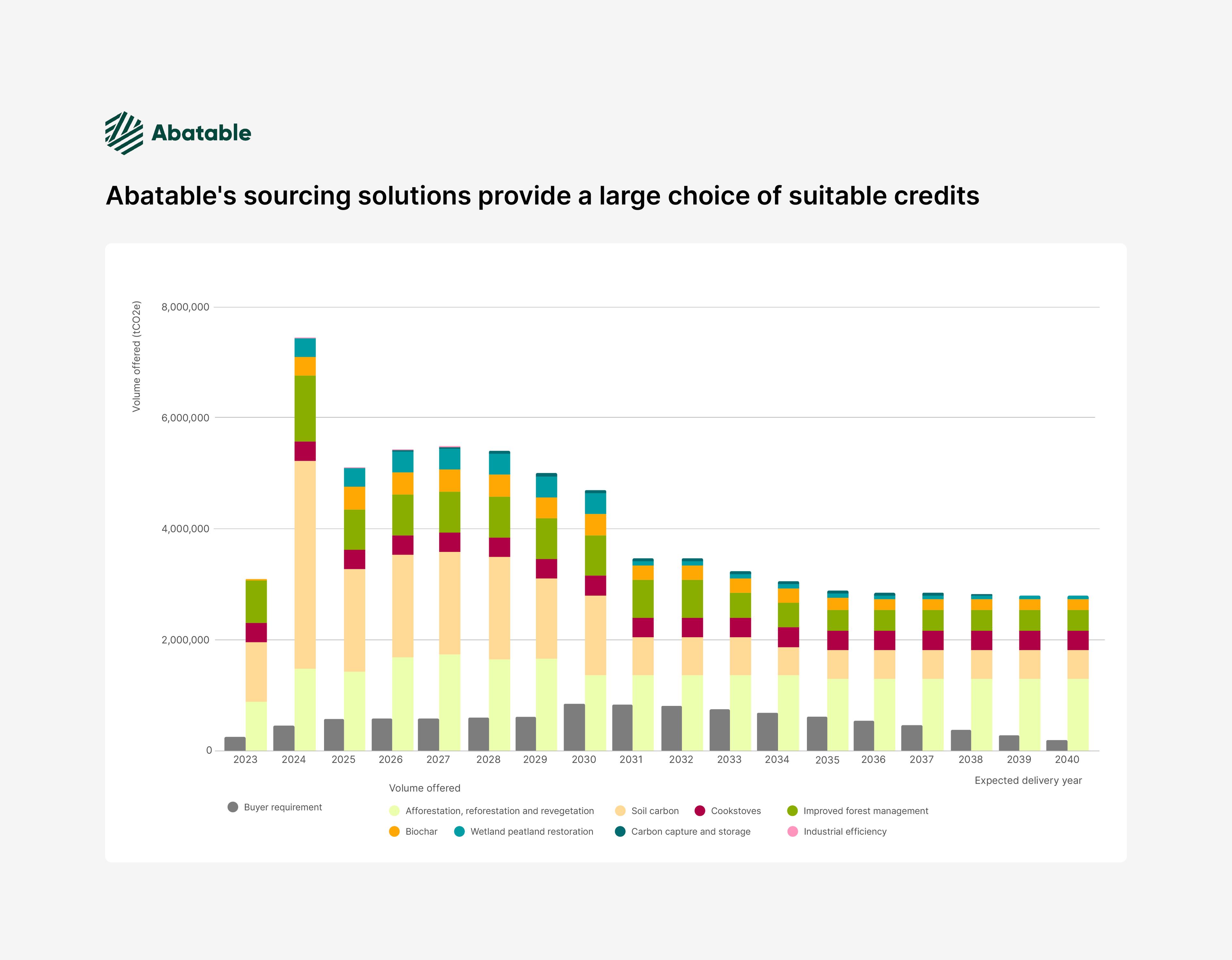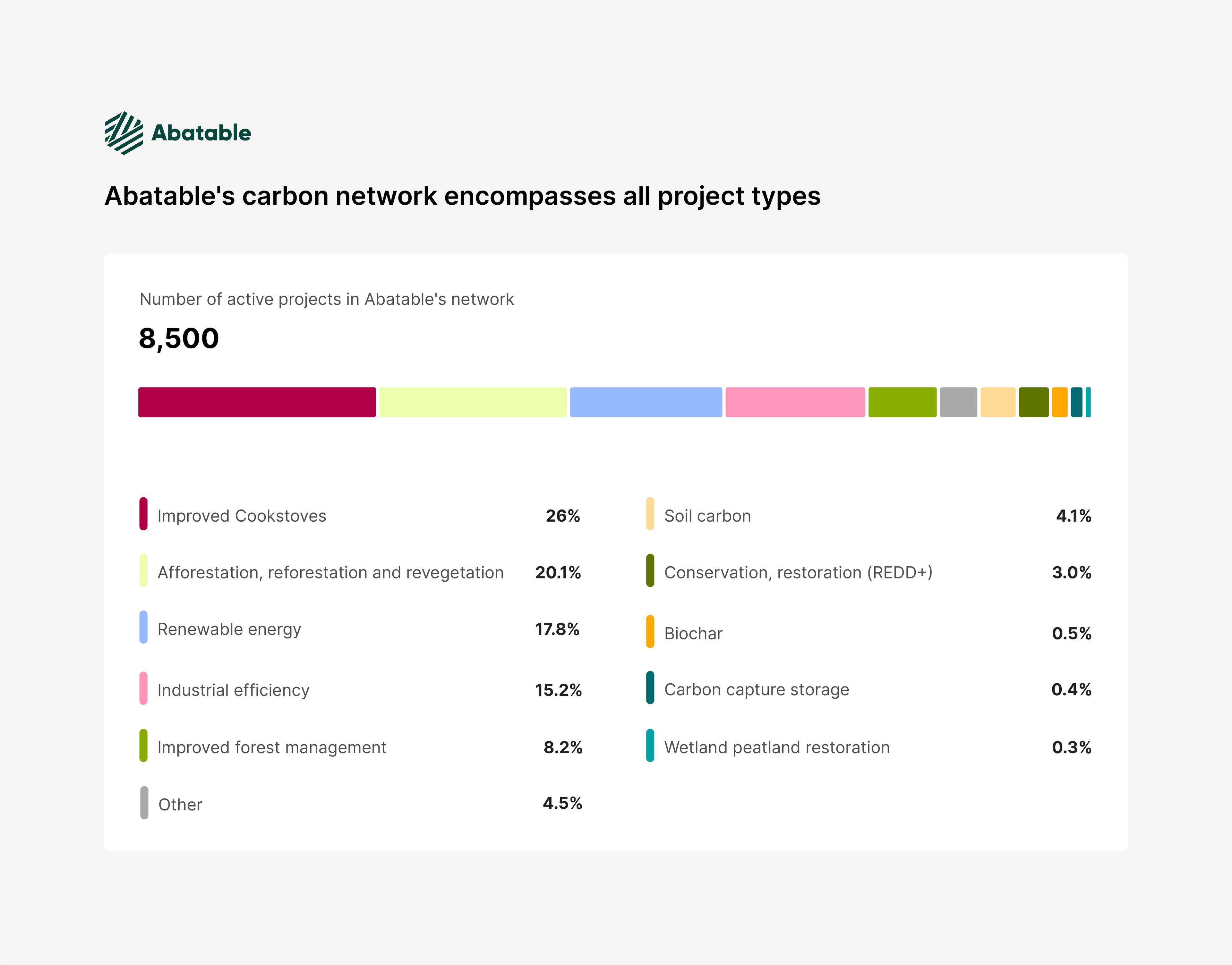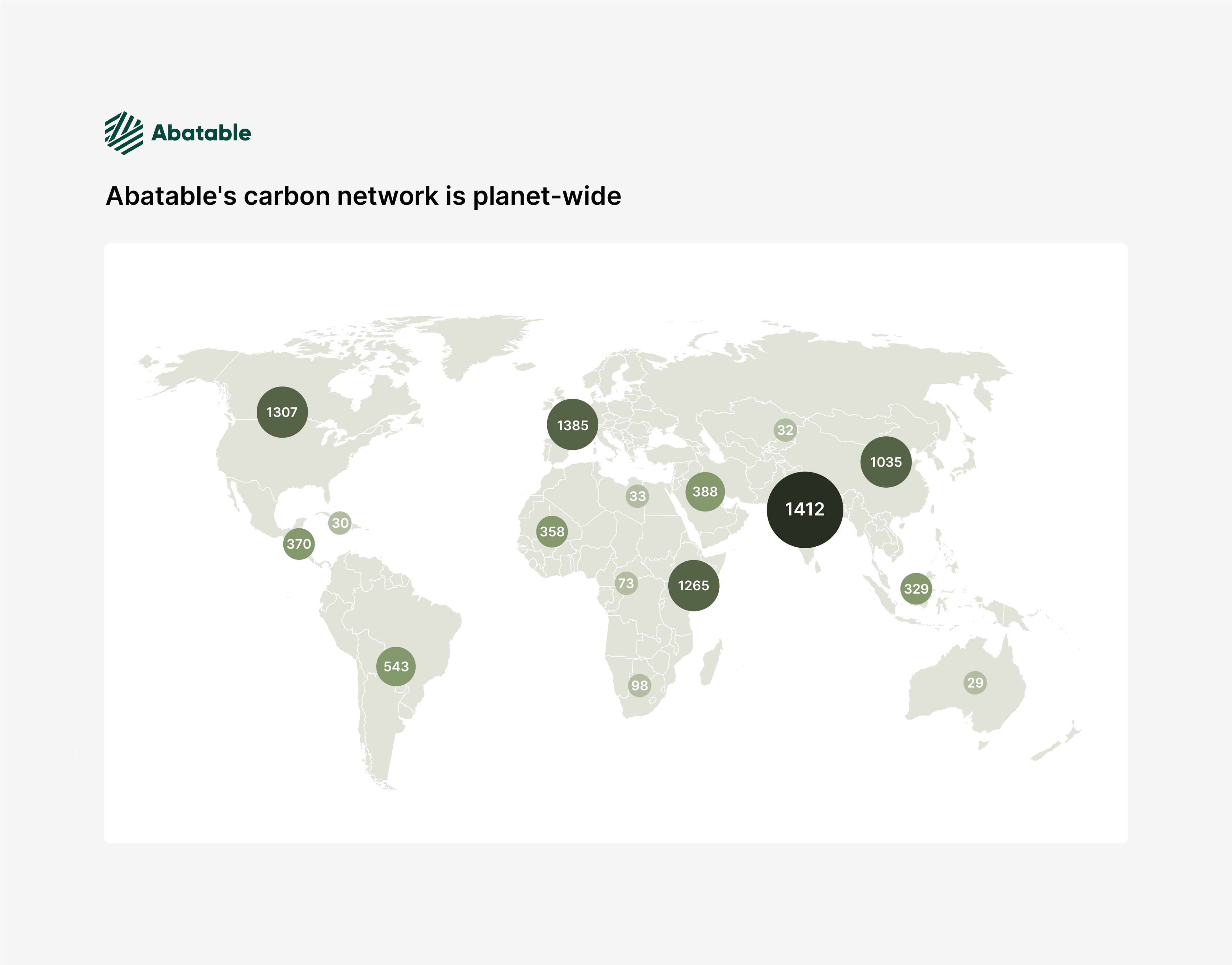Supporting high-integrity carbon projects is increasingly being recognised as a necessary part of companies doing their fair share to contribute to tackling climate change. This, combined with the fact emissions and global temperatures are continuing to rise, means sourcing high-quality carbon credits has never been more important. Abatable has developed the network and the tools to help.
How businesses talk about carbon credits is changing. Companies are moving away from ‘offsetting’ their emissions and are instead using carbon credits to contribute to additional climate action beyond their value chains. This change in approach, a steady shift over the last couple of years, has been reinforced by recent guidance from the Science-based Targets initiative and the Voluntary Carbon Markets Integrity Initiative.
What is not changing is the need to support high-quality carbon projects. To protect vital carbon sinks, to save biodiverse ecosystems, and to take CO2 out of the atmosphere.
These actions are critical if the world is to meet the goal of the Paris Agreement on climate change: to hold global temperatures to 2C, and preferably 1.5C, above pre-industrial levels. Particularly as we are nearly halfway through the ‘decade of action’ on climate change, and emissions are still rising year on year.
In short, companies need to both decarbonise and support additional climate action. The voluntary carbon market (VCM) is one avenue to achieve the latter through the purchase of high-quality carbon credits.
But there’s a problem – the VCM is a relatively opaque market, with many hurdles to navigate:
- How do you know you’ve found exactly the right project for your needs?
- How can you be sure you’re making a real impact on the ground?
- How should you balance your carbon credit portfolio to meet your climate and ESG goals?
- How can you ensure you’re paying the right price for credits, which is in line with market expectations but is also fair to project developers and local communities?
Abatable has been busy building the carbon sourcing solutions to address these questions and guide businesses in the right direction.
Efficiently navigate the whole market
Abatable has built up direct access to one of the world’s largest networks of carbon projects, covering 95% of the market and comprising over 3,200 project developers and 8,500 projects. Our network, built over eight years, captures lesser-known opportunities and also contains a select group of projects we have assessed as integrity leaders through our in-house assessment framework.
Sitting above our network we have built an interface to efficiently access it. Abatable’s proprietary carbon sourcing software allows users to browse and engage with the market with ease, allowing carbon project developers to respond directly to carbon credit buyers’ specific requirements on project type, price, registry, geography, vintage and volume.
Case study: a large choice of suitable credits
A large multinational IT and consulting company was interested in securing a tranche of carbon removal credits from different vintages and geographies to complement their recent business activity and support climate action beyond their value chain, covering delivery years from 2023 to 2040. They went out to the market through Abatable’s platform, allowing project developers to offer them credits suited to their needs based on their user-defined filters on certification standards and integrity.
With these and additional requirements on biodiversity and community impact, Abatable was able to quickly reach out to the market to invite submissions from project developers that satisfied the buyer’s criteria.
As Figure 1 illustrates, the offered eligible credits provided the buyer with a substantial choice from the market, with certain delivery years seeing them offered 16 times more suitable credits than their requirements.

As per the buyer’s specification, the majority of the credits offered were afforestation, reforestation and revegetation and industrial efficiency credits; however, post-2030 cookstove, biochar and carbon capture and storage credits increased proportionally in relation to the total number of credits on offer.
Key requirements and outcomes
A multi-year carbon credit requirement to 2040 ranging from 20,000 to 90,000 tonnes of CO2 per year
A total of 91 project developers engaged, with 32 submitting proposals
A total of 86mn tonnes of CO2 offered across the specified timeframe
A total of 37mn credits from 26 high-quality projects that met the geographic, registry and impact criteria – an average of 3.7 times the required amount
Requirements met under budget and with additional savings on costs normally paid to intermediaries due to Abatable’s transparent pricing framework
Once carbon credits have been offered, Abatable’s platform allows buyers to hone in on and secure a credit portfolio with ease.
Additional sourcing benefits
Abatable’s sourcing platform gives buyers more power in the carbon procurement process and the ability to access competitive prices directly from high-quality developers. Once a buyer’s parameters are set and the competitive tendering process is run, our standardised contracting and legal process then allows credits to be secured in a pain-free manner. Abatable can also offer guidance on which credits to select and how to structure transactions so supply and price are optimised.
We support spot and forward transactions alongside direct investment in projects, allowing buyers to forge first-hand relationships with project developers without an intermediary. This enables a better direct connection to the work companies are supporting and a thorough understanding of the impact on the ground.
Once a buyer has selected which credits to procure, project-level KPIs and various on-the-ground impact metrics are provided to support stakeholder engagement and compliance reporting.
In addition to offering a more efficient way to source carbon credits, Abatable’s platform can help mitigate risk by offering an easy means to diversify across projects, developers and geographies while using a standardised contracting process. Impact and co-benefits from the projects acquired are then easily available through Abatable’s in-house quality assessment framework covering additionality, permanence, external risks and developer experience and implementation resources.
We believe our solutions enable companies to reach further into the high-integrity carbon market and benefit from a more practical way of contracting with project developers. Ultimately we hope they will help the VCM scale with integrity.
Our network in numbers
Project types
Abatable’s network comprises over 8,500 projects across improved cookstoves, afforestation, reforestation and revegetation (ARR), REDD+, carbon capture and storage, biochar, wetland and peatland restoration, soil carbon, renewable energy, industrial efficiency and improved forest management project types (see Figure 2). These include early-stage opportunities.

Geographic distribution
The projects have a large geographic spread, as can be seen in Figure 3, with large clusters of projects in India and Africa (cookstove-dominated) and Central and South America (forest-dominated).
We expect this distribution to evolve as carbon removal credits increase in popularity as buyers become more focused on meeting the aims of the Paris Agreement, which will require a significant amount of CO2 drawn down from the atmosphere.

The Abatable portfolio
Within our network is the Abatable portfolio – a select and exclusive group of projects Abatable has assessed as leaders in the market through its proprietary assessment framework, which vets projects on a project, developer and methodology level. The due diligence framework covers evidence of additionality, emissions measurability, non-permanence and external risks, and developer experience and implementation resources.
The portfolio includes ARR, cookstove, REDD+ and improved forest management projects in Central and South America, Africa and Asia.
We are actively growing our portfolio, applying our specialist expertise to originate and bring to market projects delivering meaningful and measurable impact.
Make climate contributions with ease
To solve climate change it is essential that companies both tackle their value chain emissions and support effective carbon projects beyond them.
We think that for companies to effectively do the latter and contribute to societal climate action they need options to support the widest range of projects and geographies possible on a planetary scale. The more transparent and broad the market becomes to enable this, the better.
It was with this in mind we designed our carbon sourcing solutions to allow companies to find the right carbon credits with confidence, ease and assurance. To find out more about our carbon project network and sourcing capabilities can meet your needs, get in touch with us for a demo.